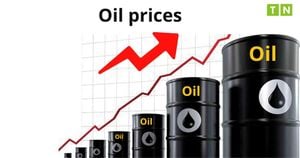The University of Michigan's Consumer Sentiment Index has reported its first decline since last July, dropping to 71.1 from December's 74.0, signaling potential shifts in consumer confidence as economic winds change.
This reduction, detailed in the revised figures released on Friday, marks not only the first downturn after six months of stability but also reflects broader apprehensions about economic conditions. The 2.9-point decline, which equates to approximately 3.9%, is even more pronounced when compared to the previous year’s figures, demonstrating a 10% decrease overall.
According to Joanne Hsu, the director of surveys at the University of Michigan, consumer sentiment weakened broadly across income and age demographics. “Consumer sentiment fell for the first time in six months, edging down 4% from December,” Hsu noted. Despite there being improvements in personal finance assessments, which climbed for the fifth consecutive month, other components of the index saw declines.
The index’s components paint a multifaceted picture of consumer outlook. While the measure of current conditions fell to 74.0 versus the previous month’s reading of 77.9, expectations for the future are even more troubling. Expectations of consumer sentiment decreased to 69.3 from 73.3, marking its lowest level since July of last year.
One of the noteworthy elements contributing to the dip is the growing concern over unemployment, with approximately 47% of consumers anticipating job losses within the year—a statistic not seen since the pandemic recession. Hsu emphasized these fears: “Despite reporting stronger incomes this month, concerns about unemployment rose; about 47% of consumers expect unemployment to rise in the year ahead.” Such apprehensions suggest consumers may be bracing for tougher times, impacting their spending behavior.
The index, which surveys consumer confidence on issues such as the economy, personal finances, and business conditions, is released twice monthly: the preliminary report mid-month and the final report at the end of the month. The final January report issued by the University of Michigan highlights how consumers' perceptions have shifted, correlatively with other broader economic sentiments.
Those who participated in the survey indicated they still perceive purchasing goods now as favorable, perhaps seeing it as protective against future price increases. Despite this, buying conditions for durable goods softened slightly, hinting at some hesitation among consumers as their confidence wanes.
Inflation expectations also played a significant role this month, with one-year inflation expectations stabilizing at 3.3%, identical to the preliminary estimate, and 5-year expectations remaining at 3.2%. According to the data, this stabilization suggests cautious optimism but reveals the underlying concerns consumers have about longer-term economic stability.
Interestingly, the sentiment drop follows closely after recent political events, leading some analysts to speculate potential influences from the electoral outcomes which could have inadvertently impacted public confidence. Current views suggest some believe rising tariffs could yield lower inflation, whereas others argue against this, creating confusion on how economic policies might shape the future.
The mixed signals from the index provide valuable insights for policymakers and economists alike. While income growth and employment remain pivotal to restoring consumer sentiment, the rising fears of unemployment could overshadow these positive trends if left unchecked. The figures offer both opportunities and challenges as the U.S. navigates through what might be volatile economic waters.
By compiling sentiments across diverse income and demographic segments, the University of Michigan's Consumer Sentiment Index serves as a bellwether for other economic indicators. Analyzing these sentiments provides pivotal insights as policymakers engage with the realities shaping consumer experiences.
This recent drop to 71.1 serves as just one indicator of the shifting tides of consumer confidence. While current conditions may reflect improvements, the expectations for the future reveal surfacing doubts. Where consumer sentiment goes, so too does the economy; the next steps taken by consumers will be telling for what lies ahead.



